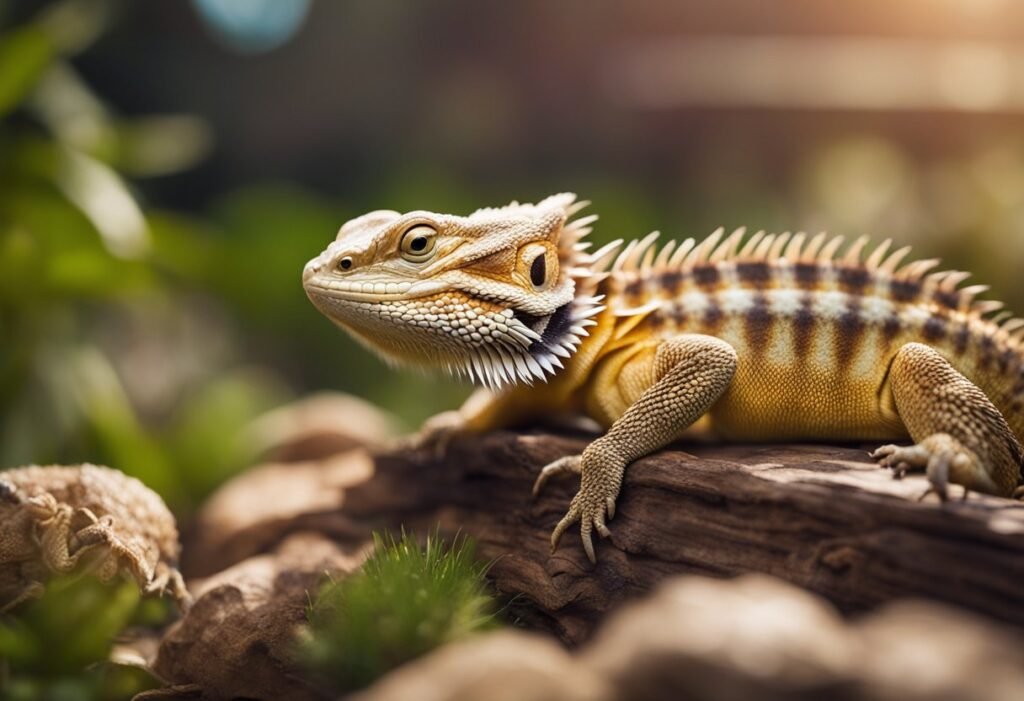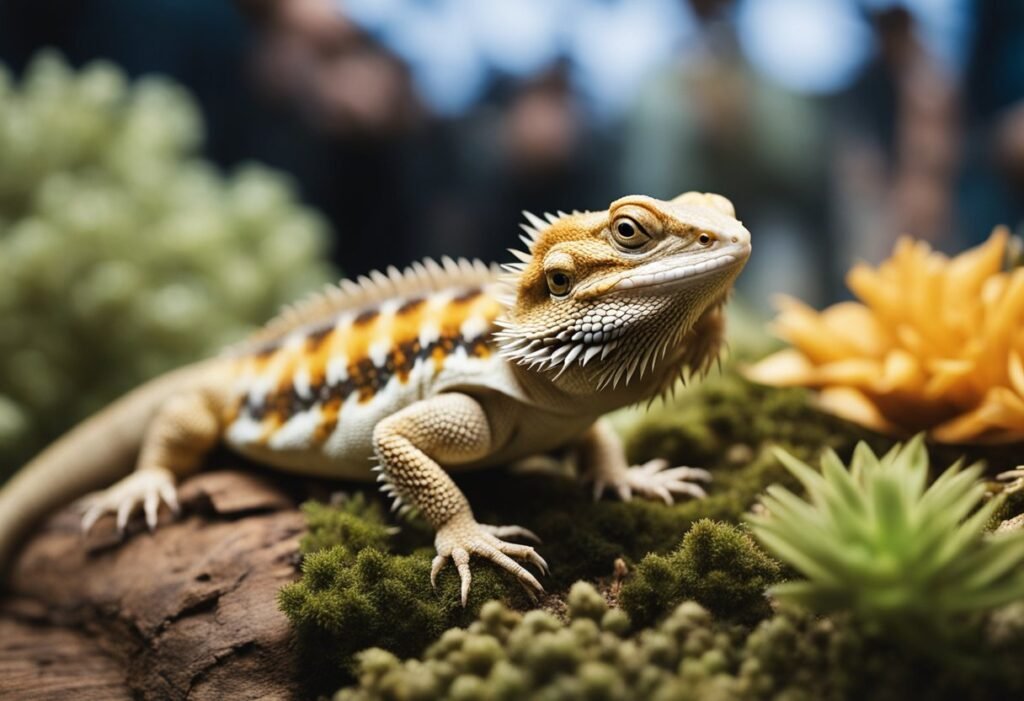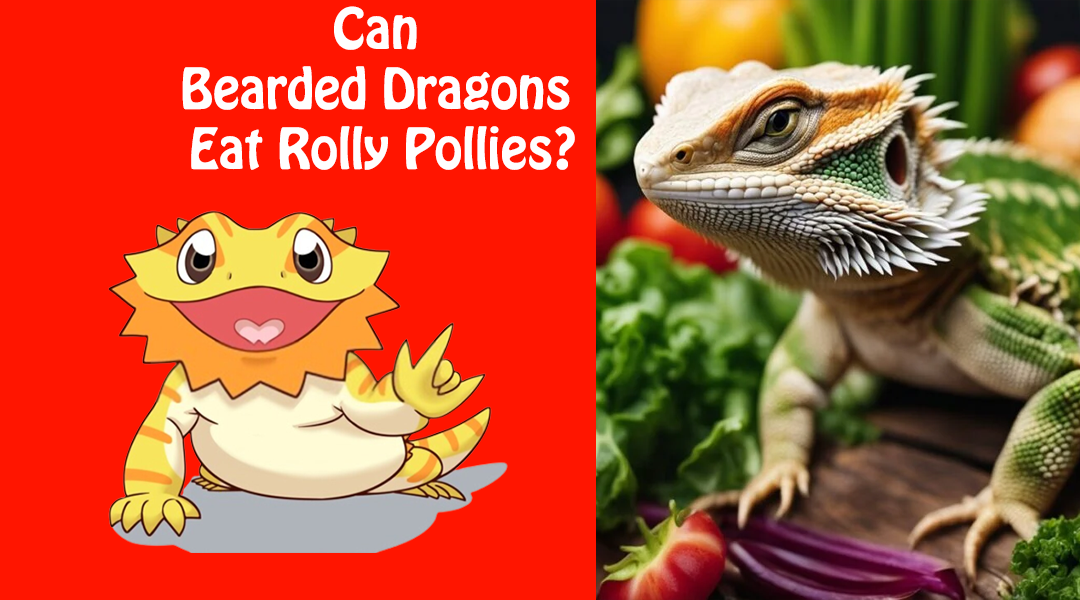Bearded dragons are fascinating creatures that are popular pets among reptile enthusiasts. These docile lizards have a unique diet that consists of a variety of insects, fruits, and vegetables. However, many owners wonder if it’s safe to feed their bearded dragons rolly pollies, also known as pill bugs or sow bugs. In this article, we will answer the question, “Can bearded dragons eat rolly pollies?” and provide you with all the information you need to know about this topic.
Rolly pollies are a common sight in many gardens and backyards, making them an easy and convenient food source for bearded dragons. These small, crustacean-like creatures are known for their ability to roll up into a ball when threatened, hence their name. While rolly pollies are not toxic to bearded dragons, it’s important to know whether they are a suitable part of their diet. In the following sections, we will discuss the nutritional value of rolly pollies, their potential benefits and risks, and how to feed them to your bearded dragon safely.
Bearded Dragon Dietary Basics

Nutritional Requirements
As responsible pet owners, it’s important to ensure that our bearded dragons receive a balanced and nutritious diet. Bearded dragons are omnivores, which means they eat both plants and animals. In the wild, they eat a variety of insects, vegetables, and fruits. In captivity, it’s important to replicate their natural diet as much as possible.
Bearded dragons require a diet that is high in protein and low in fat. They also need a good balance of vitamins and minerals. Calcium is especially important for bearded dragons, as it helps to keep their bones strong and healthy. A lack of calcium in their diet can lead to metabolic bone disease, which can be fatal.
Common Food Items
There are many different food items that are suitable for bearded dragons. Some of the most common food items include:
- Crickets
- Mealworms
- Dubia roaches
- Collard greens
- Mustard greens
- Kale
- Squash
- Carrots
- Bell peppers
- Blueberries
- Apples
It’s important to provide a variety of different foods to ensure that your bearded dragon receives all of the necessary nutrients. When feeding insects, it’s important to gut-load them first, which means feeding them a nutritious diet before offering them to your bearded dragon. It’s also important to dust the insects with a calcium supplement to ensure that your bearded dragon is getting enough calcium.
While rolly pollies, also known as pillbugs or woodlice, are not toxic to bearded dragons, they are not a suitable food item. Rolly pollies have a hard exoskeleton that can be difficult for bearded dragons to digest. Additionally, they do not provide any significant nutritional value. It’s best to stick to feeding your bearded dragon a diet of insects, vegetables, and fruits that are known to be safe and nutritious.
Understanding Rolly Pollies

Rolly pollies, also known as pill bugs or woodlice, are small crustaceans that can be found in many different environments. They are often used as a food source for other animals, including some species of reptiles like bearded dragons. In this section, we will discuss the dietary composition of rolly pollies, as well as potential risks associated with feeding them to your bearded dragon.
Dietary Composition
Rolly pollies are omnivores, which means they eat both plant and animal matter. Their diet consists mainly of decaying plant material, but they also consume small insects and other arthropods. Rolly pollies are a good source of protein and calcium, which are important nutrients for bearded dragons.
Potential Risks
While rolly pollies can be a nutritious addition to your bearded dragon’s diet, there are some potential risks to consider. One risk is that rolly pollies may contain harmful bacteria or parasites that can make your bearded dragon sick. To minimize this risk, it is important to only feed your bearded dragon rolly pollies that are captive-bred and free of any signs of illness.
Another potential risk is that rolly pollies may contain high levels of heavy metals or other toxins if they are collected from polluted environments. To avoid this risk, it is best to only feed your bearded dragon rolly pollies that are purchased from a reputable source.
In conclusion, rolly pollies can be a nutritious addition to your bearded dragon’s diet, but it is important to consider the potential risks before feeding them. By ensuring that your rolly pollies are healthy and free of toxins, you can provide your bearded dragon with a varied and nutritious diet.
Feeding Rolly Pollies to Bearded Dragons

Preparation and Serving Size
When it comes to feeding rolly pollies, also known as pill bugs or sow bugs, to bearded dragons, it is important to make sure they are properly prepared and served in an appropriate size. Rolly pollies are a good source of protein and fiber, but they should not be the only source of food for your bearded dragon.
To prepare rolly pollies for your bearded dragon, you can either purchase them from a pet store or collect them from your yard. If you choose to collect them, make sure they are free of any pesticides or other harmful chemicals. You can feed rolly pollies to your bearded dragon alive or dead, but it is recommended to freeze them for a few hours before feeding to kill any potential parasites.
When it comes to serving size, it is important to consider the size of your bearded dragon. As a general rule, you should not feed your bearded dragon more than the size of their head in food at one time. For juvenile bearded dragons, start with smaller amounts and gradually increase as they grow.
Frequency of Feeding
While rolly pollies can be a good addition to your bearded dragon’s diet, they should not be fed too frequently. Overfeeding rolly pollies can lead to an imbalance in your bearded dragon’s diet, potentially causing health issues.
As a general guideline, you can feed rolly pollies to your bearded dragon once or twice a week, in addition to other protein sources such as crickets, mealworms, and superworms. It is important to vary their diet to ensure they are getting all the necessary nutrients.
In summary, rolly pollies can be a good addition to your bearded dragon’s diet, but it is important to prepare and serve them appropriately and not overfeed them. As always, consult with a veterinarian or reptile specialist if you have any concerns about your bearded dragon’s diet.
Health Considerations
Parasitic Transmission
When considering feeding your bearded dragon rolly pollies, it is important to be aware of the potential risk of parasitic transmission. Rolly pollies, also known as pill bugs or woodlice, can carry parasites such as mites, ticks, and intestinal worms. These parasites can be harmful to your bearded dragon’s health and may lead to serious health issues if left untreated.
To minimize the risk of parasitic transmission, we recommend thoroughly cleaning and gut-loading the rolly pollies before feeding them to your bearded dragon. Additionally, it is important to ensure that the rolly pollies come from a reliable source and have not been exposed to other animals that may carry parasites.
Toxicity and Pesticides
Another health consideration when feeding rolly pollies to your bearded dragon is the potential for toxicity and pesticide exposure. Rolly pollies are known to accumulate heavy metals and pesticides from their environment, which can be harmful to your bearded dragon if ingested.
To minimize the risk of toxicity and pesticide exposure, we recommend avoiding feeding rolly pollies that have been collected from areas with high levels of pollution or pesticide use. Additionally, it is important to thoroughly wash and gut-load the rolly pollies before feeding them to your bearded dragon.
Overall, while rolly pollies can be a nutritious addition to your bearded dragon’s diet, it is important to take necessary precautions to ensure their health and well-being.
Alternative Insect Options
When it comes to feeding our bearded dragons, it’s important to provide them with a balanced diet that includes a variety of insects. While rolly pollies may seem like a convenient option, it’s important to note that they should not be a staple in their diet. In this section, we’ll explore some alternative insect options that are safe for bearded dragons to eat.
Safe Insect Choices
Here are some safe insect choices that you can offer your bearded dragon:
- Crickets: Crickets are a popular choice for bearded dragons. They are high in protein and easy to find at most pet stores. Make sure to gut-load them with nutritious foods before feeding them to your dragon.
- Dubia Roaches: Dubia roaches are another great option. They are low in fat and high in protein, making them a nutritious choice for your bearded dragon.
- Mealworms: Mealworms are a good source of protein, but they should be fed in moderation as they are high in fat. Make sure to gut-load them before feeding them to your dragon.
Insects to Avoid
While there are many safe insect options for your bearded dragon, there are also some insects that should be avoided. Here are a few to keep in mind:
- Fireflies: Fireflies contain a toxic chemical called lucibufagins, which can be harmful to your bearded dragon if ingested.
- Wild-Caught Insects: Insects that are caught in the wild can contain pesticides and other harmful chemicals. It’s best to stick with insects that are bred specifically for feeding to reptiles.
- Butterworms: Butterworms are high in fat and should be fed in moderation. They also contain a high amount of calcium, which can lead to health problems if overfed.
Overall, it’s important to provide your bearded dragon with a varied diet that includes a variety of safe insect options. By doing so, you can ensure that your dragon is getting all of the nutrients they need to stay healthy and happy.
Frequently Asked Questions

Are pill bugs a safe food choice for bearded dragons?
Pill bugs, also known as rolly pollies or woodlice, are a common food choice for bearded dragons. They are a good source of protein and fiber, but they should not be the main component of a bearded dragon’s diet. It is important to offer a variety of insects to ensure a balanced diet.
What insects should be avoided in a bearded dragon’s diet?
There are some insects that should be avoided in a bearded dragon’s diet, such as fireflies, cicadas, and beetles. These insects can be toxic to bearded dragons and can cause serious health problems.
Can bearded dragons safely consume garden insects?
Bearded dragons can safely consume a variety of garden insects, such as crickets, mealworms, and waxworms. However, it is important to avoid using pesticides or insecticides in the garden, as these can be harmful to bearded dragons.
What are the potential risks of feeding wild insects to bearded dragons?
Feeding wild insects to bearded dragons can be risky, as they may have been exposed to pesticides or other harmful chemicals. It is important to only feed captive-bred insects to bearded dragons to ensure their safety.
Which common garden bugs can bearded dragons eat?
Bearded dragons can safely consume a variety of common garden bugs, such as grasshoppers, roaches, and crickets. These insects should be gut-loaded and dusted with calcium and vitamin supplements before being fed to the bearded dragon.
How does the diet of bearded dragons differ from that of leopard geckos?
Bearded dragons and leopard geckos have different dietary requirements. Bearded dragons require a diet that is higher in protein and fiber, while leopard geckos require a diet that is higher in fat. It is important to research the specific dietary needs of each species before feeding them.
I, Mark Antonelli am highly interested in pet care tips. The experiences I gained through university life in animal sciences were also helpful to identify the best tricks for caring for and feeding varying kinds of pets. I know the majority of people love to own a pet. Yet, there is a guilty of owing a Bearded Dragon due to a lack of information about how much friendly and peaceful they are. I thought of filling this gap with detailed writings about this Pogona genus Bearded Dragon. All my team is also giving me great support to fulfil my mission. Hope you will enjoy the journey with us.

